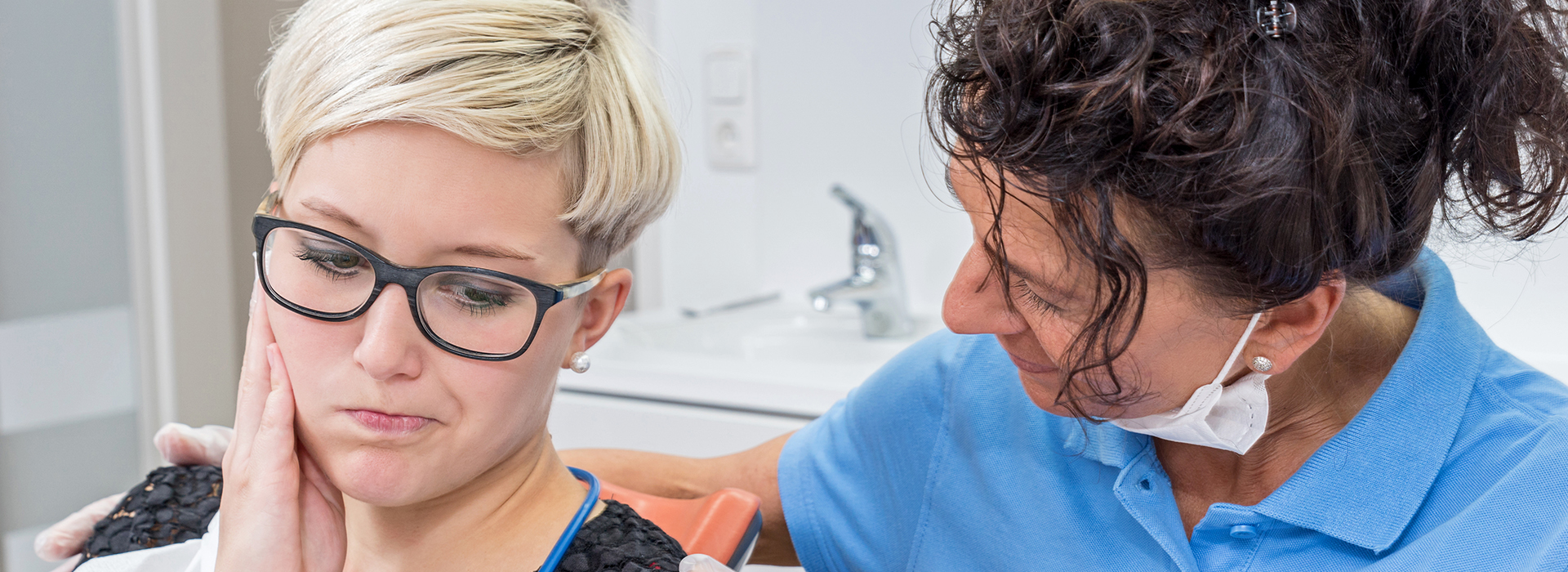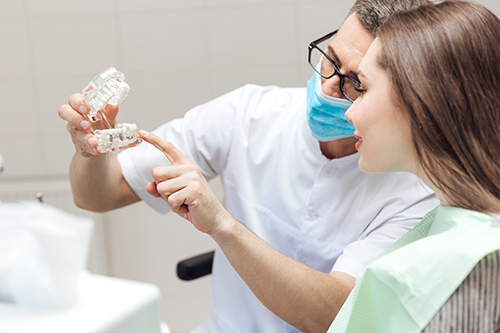
Dental pain, swelling, or trauma can be more than a short-term nuisance — they can signal conditions that need prompt attention to prevent lasting damage. If you experience severe, unrelenting tooth pain, persistent bleeding, sudden swelling of the face or jaw, or a tooth that has been knocked out, don’t wait to seek care. These symptoms can indicate infection, nerve injury, or structural damage that benefit from quick evaluation and treatment.
Not every dental issue requires immediate in-office intervention, but certain signs should shorten your timeline to professional care. Intense pain that interferes with eating or sleeping, spreading redness or warmth, fever accompanying oral symptoms, or difficulty breathing or swallowing are red flags. Acting early can reduce the extent of treatment needed and lower the risk of complications that affect your overall health.
Common urgent oral problems include more than just toothaches. Broken or fractured teeth, displaced or lost crowns and fillings, painful wisdom tooth flare-ups, abscesses, and lacerations to the lips or gums can demand same-day attention. We also see issues like sudden loosening of teeth, persistent bleeding after an extraction, and acute periodontal pain that patients often describe as the worst toothache of their life.
Below is a practical list of situations that typically warrant an urgent dental visit so you can recognize them quickly:
When you arrive for an emergency visit, our first priority is a focused assessment to identify the source and severity of the problem. The initial exam typically includes a thorough visual inspection, a discussion of symptoms and recent events that led to the issue, and targeted imaging when necessary. This triage lets us prioritize pain relief and make informed decisions about next steps.
Pain management is a central part of the first visit. We use evidence-based approaches such as local anesthesia, short-term prescriptions when appropriate, or in-office procedures to relieve pressure and discomfort. Controlling pain and swelling quickly not only improves comfort but also makes definitive care — whether a restoration, root canal, or referral — easier and safer to perform.
Once immediate symptoms are under control, we discuss treatment options that balance preserving natural teeth with restoring function. Sometimes a temporary stabilization is the safest route to relieve symptoms and protect the tooth until a more comprehensive repair can be scheduled. Other times, definitive treatment is both possible and advisable during the same appointment.
We will also communicate clearly about follow-up care. Emergencies often require staged treatment: an initial visit to address urgent problems, followed by appointments to complete restorations or monitor healing. Clear instructions on home care and warning signs to watch for are part of every emergency plan we provide to patients.
There are several predictable procedures that resolve common urgent dental problems. For a fractured tooth, dental bonding or a temporary crown can protect exposed dentin and nerve tissue while a long-term crown is fabricated. When an old filling breaks, replacing it quickly can prevent decay from progressing and causing deeper infection.
If infection has reached the tooth pulp, root canal therapy is often the best option to preserve the natural tooth. This procedure removes infected tissue, disinfects the internal canal space, and seals it to prevent recurrence. Modern techniques and materials make this a predictable solution that relieves pain and allows the tooth to return to function with an appropriate restoration.
In cases of advanced damage where a tooth cannot be saved safely, extraction may be necessary to protect surrounding tissues and overall oral health. Today’s extraction methods emphasize patient comfort and safe healing. When a tooth is lost, we discuss replacement options so you understand how to restore chewing ability, prevent shifting of neighboring teeth, and preserve jawbone health.
Emergency care also includes soft-tissue treatments — for example, suturing torn gum tissue, draining an abscess when indicated, or adjusting dental appliances that are causing trauma. For a fully avulsed tooth, prompt reimplantation within a narrow time window can sometimes salvage the tooth; knowing the correct first-aid steps and getting to a dental office quickly are critical in these situations.
Immediate actions you take can reduce pain and improve outcomes while you arrange for professional care. For a knocked-out tooth, gently rinse contaminants with milk or saline — never scrub the root — and try to reinsert the tooth if possible, holding it in place and seeking dental help right away. If reinsertion isn’t possible, store the tooth in milk or a tooth-preservation solution and get to the office without delay.
For a severe toothache, rinse with warm salt water to help reduce inflammation and dislodge debris. Over-the-counter pain relievers and cold compresses applied outside the cheek can help manage pain and swelling until you can be seen. Avoid placing aspirin or other medications directly on the gum tissue, as this can irritate oral tissues.
If a crown or filling comes loose, keep the piece if you can and bring it to your appointment. A temporary dental cement from a pharmacy can provide short-term protection, but avoid attempting complex repairs yourself. For soft-tissue cuts, a clean cloth and steady pressure can control bleeding; if bleeding is heavy or persists, seek urgent care immediately.
Remember that swelling, fever, or difficulty breathing or swallowing are signs of potentially serious infection; these symptoms require prompt professional attention rather than home measures alone. When in doubt, contact a dental professional to describe your symptoms and receive guidance tailored to your situation.
We design our emergency services around patient comfort, clinical excellence, and clear communication. Our team combines clinical training, modern diagnostic tools, and thoughtful pain-control strategies so you receive care that is both effective and humane. We prioritize protecting natural teeth while offering practical solutions when preservation isn’t possible.
Coordination is a key part of urgent care: when a condition requires specialty input, we can arrange timely referrals and collaborate closely with oral surgeons, endodontists, or medical providers. That collaborative approach helps ensure you receive the right level of care without delay or unnecessary steps.
At Smiles Dental at Reston Town Center, we reserve time in our schedule for urgent visits and strive to respond quickly when patients call with acute problems. Our goal is to remove anxiety from the experience by explaining each step, addressing pain promptly, and creating a clear plan for complete recovery.
We recognize that emergencies are stressful. From the moment you contact our office through follow-up care, we focus on restoring comfort, protecting oral health, and helping you return to normal life as quickly as possible.
In summary: dental emergencies deserve prompt attention, practical immediate care makes a difference, and a coordinated treatment plan protects long-term oral health. If you are experiencing a dental emergency or are unsure whether your symptoms require urgent care, please contact us for more information and assistance.


Pain is your body's way of signaling that something is not quite right and though there are many reasons for oral pain, one of the most common complaints and reasons for seeking urgent dental care is a toothache. Whether you simply need a dental filling, a crown, or require a root canal procedure to save your tooth, we'll alleviate your discomfort and restore the look and function of the involved tooth.

Dental trauma can result in a defect as minor as a small chip in tooth enamel to a more extensive and painful crack or fracture. With sufficient force, a tooth can even be displaced or completely knocked out of its socket. With prompt emergency care, many injured teeth can be restored and saved.

The last teeth in your mouth to develop, wisdom teeth often do not have enough room to fully erupt or may be positioned in the wrong direction. These issues can affect your dental health as well as overall well-being. Our office provides skilled care to address the complications caused by problematic wisdom teeth.

A broken or lost dental prosthesis or restoration can cause embarrassing gaps in your smile as well as compromise your ability to eat and speak with ease. If you've lost or broken a dental filling, denture, crown, or other dental appliance, you can rely on our office to perform a prompt repair or provide a durable and cosmetically pleasing replacement as quickly as possible.
At the office of Smiles Dental at Reston Town Center, emergency appointments are always available. Of course, in addition to providing top treatment for dental emergencies, we also welcome patients searching for high quality and affordable care. We offer a complete range of the latest and best cosmetic and dental services for every member of your family.
If you are suffering from a toothache or have sustained a dental injury, it is important to visit the dentist as soon as possible before more serious complications arise. Whether your dental emergency is painful, if it affects the appearance of your smile, or if you suspect that an infection is present, our office will make every effort to see you as promptly as possible for care.
At the office of Smiles Dental at Reston Town Center, we treat your dental emergency as our top priority. Our caring team will respond to your emergency call right away, making sure you get the gentle, state-of-the-art care you need without delay.
As your trusted emergency dentist in Reston, we provide the highest quality of care to mitigate the stress, anxiety, and discomfort of dental problems. Our dedicated team will help you start feeling better as soon as we receive your emergency call.
At the office of Smiles Dental at Reston Town Center, we provide skilled and experienced care to effectively resolve a broad range of dental emergencies, restoring a patient's oral health while protecting their overall wellbeing.
However, even so, specific dental emergencies pose significant threats to one's health. These situations require immediate, emergency room care. Serious and potentially life-threatening dental emergencies include significant oral and facial trauma such as jaw fractures, deep wounds or lacerations to the face and mouth, an abscess or infection that causes widespread facial or submandibular swelling, or affects breathing and swallowing.
At the office of Smiles Dental at Reston Town Center, we provide prompt, skilled, and experienced care to address dental emergencies. We understand that finances are always a concern and do our best to provide options in care that are both affordable and respect your budget.
Once we've had the opportunity to examine your smile, we can give you a clear picture of any existing dental issues, along with a quote for what the cost of treatment will be. The cost of care all depends upon the extent and complexity of issues affecting the health or appearance of your smile and the types of procedures that are required.
To help alleviate any additional stress or delay, you can count on our staff to work with you to optimize coverage for your dental care and to minimize your out-of-pocket expenses. For patients without insurance, we strive to make things easier as well! We invite you to visit our financial information page or speak to an expert in our business office.
Dental emergencies are often painful and debilitating experiences. For this reason it's important to have an emergency dentist in Reston, who welcomes patients with urgent dental needs while providing the prompt care required to restore oral health.
Here are just some of the reasons why so many patients choose our office for emergency dental care and to meet their family's dental needs:
We're dedicated to helping patients enjoy good oral health and beautiful smiles. We look forward to helping you keep your smile in tip-top condition. You can rest assured that our highly skilled office team will provide you the highest quality of state-of-the-art dental care and have you smiling again in no time!
To make an appointment or for more information on our office and the many state-of-the-art services we provide, give us a call today.
A dental emergency is any oral problem that requires prompt professional attention to prevent lasting damage or a threat to overall health. Typical emergencies include severe, unrelenting tooth pain; visible or painful swelling of the face, jaw or neck; uncontrolled bleeding; and a tooth that has been knocked out. Difficulty breathing or swallowing alongside oral symptoms is an emergency that needs immediate care.
Not every dental concern needs same-day in-office treatment, but certain signs should shorten the timeline to professional evaluation. Intense pain that interferes with eating or sleeping, fever with oral symptoms, spreading redness, or persistent drainage are red flags. Acting quickly can reduce complications and limit the extent of definitive treatment required later on.
If a permanent tooth is completely avulsed, handling it correctly can improve the chance of saving it. Gently rinse dirt off the tooth with milk or saline and avoid scrubbing the root surface; if possible, reinsert the tooth into its socket and hold it in place while seeking dental care. If reinsertion isn’t possible, store the tooth in milk, saline, or a tooth-preservation solution and get to a dental office immediately.
Time is critical for a knocked-out tooth, so arrange emergency dental care as soon as possible. Keep the tooth moist and avoid placing it in plain water for prolonged periods because water can damage root cells. When you arrive, the dental team will assess whether reimplantation is feasible and take steps to stabilize and protect the tooth.
An emergency room is appropriate for life-threatening situations or when medical stabilization is required before dental care can begin. Seek emergency medical attention if you have difficulty breathing or swallowing, severe uncontrolled bleeding that does not respond to pressure, or other signs of systemic compromise such as fainting or altered consciousness. These symptoms may indicate a medical emergency that needs immediate hospital-level care.
For most dental emergencies—severe tooth pain, broken teeth, lost crowns, or localized infections—the dental office is the best place for focused treatment and tooth-preserving care. Your dental team can triage the problem, provide pain relief, perform urgent procedures, and coordinate referrals to specialists or medical providers when necessary. If you are unsure which setting is best, call the dental office to describe your symptoms and receive guidance.
An emergency visit begins with a focused triage to identify the source and severity of the problem and to prioritize safe, effective pain control. The clinician will perform a visual exam, ask about symptoms and recent events, and use targeted imaging when needed to diagnose fractures, infections, and other issues. Initial treatment emphasizes relieving pain and stabilizing the area so definitive care can follow.
Depending on the diagnosis, treatment may include local anesthesia, temporary stabilization with a bandage or crown, drainage of an abscess, or prescriptions for antibiotics or pain medication. The dentist will explain immediate steps, discuss follow-up care, and schedule any necessary restorative or specialty appointments. Clear instructions for home care and warning signs to watch for are provided before discharge.
Pain and swelling are managed quickly using a combination of local measures, in-office procedures, and appropriate medications to reduce discomfort and limit the spread of infection. Local anesthesia, pressure relief through drainage of an abscess when indicated, and temporary protective restorations are common techniques used during the first visit. Cold compresses and over-the-counter analgesics can also help while arranging definitive care.
When an infection is suspected to be spreading, the dentist may prescribe antibiotics to help control bacterial growth while planning further treatment. Prompt drainage of an abscess, when appropriate, reduces pressure and pain and improves the effectiveness of systemic medications. Follow-up appointments are often needed to complete restorative procedures or perform root canal therapy once acute symptoms have been controlled.
If a crown or filling becomes loose or breaks, try to save the piece and avoid chewing on that side to reduce further damage. A temporary dental cement from a pharmacy can provide short-term protection if you are unable to see a dentist immediately, but avoid attempting complex repairs yourself. Keeping the area clean with gentle rinsing and soft foods can minimize irritation until professional care is available.
Prompt evaluation is important because exposed dentin or the underlying tooth structure is more susceptible to decay and infection. The dental team will assess whether the existing restoration can be re-cemented, needs replacement, or if additional treatment such as a crown or root canal is necessary. Early attention often allows for more conservative, tooth-preserving options.
Yes, when an infection has reached the tooth pulp, root canal therapy is a predictable treatment to remove infected tissue and preserve the natural tooth. In an emergency setting the dentist may perform an initial procedure to relieve pain, such as opening and disinfecting the canal space, followed by antibiotics or temporary sealing depending on the situation. These steps stabilize the tooth and reduce symptoms, allowing for completion of root canal therapy in a subsequent visit.
Modern endodontic techniques and materials make root canal treatment highly effective in relieving pain and restoring function while avoiding extraction when feasible. The dentist will explain the prognosis, necessary restorative work after root canal therapy, and any signs that would require faster or more urgent intervention. Coordination with an endodontic specialist can be arranged if the case requires advanced care.
An extraction may be the safest option when a tooth is so badly fractured, infected, or decayed that preserving it would pose a risk to surrounding tissues or overall health. In some cases, extensive damage, severe bone loss, or an infection that does not respond to conservative measures means removal is necessary to control pain and prevent spread. The decision to extract is always made with patient comfort and long-term oral health in mind.
Extractions today prioritize patient comfort and predictable healing with techniques that minimize trauma and support recovery. After removal, the dentist will discuss appropriate replacement options to restore chewing function and prevent shifting of adjacent teeth, and will provide clear aftercare instructions to support healing. At Smiles Dental at Reston Town Center we aim to preserve natural teeth when possible and to counsel patients on safe, evidence-based alternatives when extraction is recommended.
For soft-tissue cuts in the mouth, apply steady, gentle pressure with a clean cloth or gauze to control bleeding and use a cold compress outside the cheek to reduce swelling. Avoid rinsing vigorously or placing medications directly on the wound, and keep the head elevated to help minimize bleeding. If bleeding is heavy or does not respond to continuous pressure for 15–20 minutes, seek immediate professional care.
Dentists can suture torn gum tissue, provide antiseptic care, and advise whether antibiotics or tetanus considerations are necessary. Prompt evaluation also reduces the risk of infection and helps ensure proper healing and minimal scarring. When in doubt about the severity of a soft-tissue injury, contact your dental office or seek urgent medical attention.
Emergency visits often represent the first stage of care: immediate relief and stabilization are followed by a tailored plan to complete definitive treatment. The dental team will explain next steps, schedule any necessary restorative appointments, and provide written home-care instructions to support healing and prevent complications. If a case needs specialty care—such as endodontics, oral surgery, or medical collaboration—the office will coordinate timely referrals and share relevant records.
We reserve time in the schedule to respond to urgent calls and strive to make follow-up scheduling efficient so that care is completed without unnecessary delays. For urgent appointments or to describe your symptoms, call our office at (703) 291-4666 for new patients or (703) 437-0007 for existing patients, and the team will guide you through the next steps. At Smiles Dental at Reston Town Center we focus on clear communication and coordinated care to help you recover quickly and safely.

Ready to schedule your next dental appointment or have questions about our services?
Contacting Smiles Dental at Reston Town Center is easy! Our friendly staff is available to assist you with scheduling appointments, answering inquiries about treatment options, and addressing any concerns you may have. Whether you prefer to give us a call, send us an email, or fill out our convenient online contact form, we're here to help. Don't wait to take the first step towards achieving the smile of your dreams – reach out to us today and discover the difference personalized dental care can make.